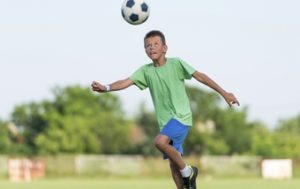Editor’s Note: Is it safe to get back to the life you knew? As services come back, we’re asking our doctors and other providers to help answer those questions in a series called Navigating COVID: Back to life. You’ll find those stories, and many others, here. Got a question? Email healthyheadlines@novanthealth.org.
Navigating COVID: Back to life
Three months without sports left players, coaches and fans itching to return. Several non-contact sports have resumed, all with guidelines to prevent the spread of COVID-19.
Things are going to look very different.
The N.C. Department of Health and Human Services and Gov. Roy Cooper released a set of guidelines for youth, high school and college sports in North Carolina. Non-contact sports must follow the recommendations, which emphasize social distancing, face masks and not sharing equipment. The highlights:
– Common seating areas, such as dugouts and bleachers, should be closed or marked off.
– Refrain from shaking hands, giving high-fives or fist bumps.
– During practices, players should be in small groups that always work together (less exposure to more people).
– Every athlete, coach and staff should wear a facemask when they’re not actively engaged in physical activity or close to other people.
Kendall D’India, a Novant Health certified athletic trainer, is the head athletic trainer for the Charlotte Independence Soccer Club, which recently launched practice for thousands of youngsters in the Charlotte region. She’s on the field monitoring player safety and watching them adjust to the new rules.
“The biggest adjustment has probably been the social distancing, especially when they’re entering the field,” D’India said. “They haven’t seen their teammates in months and they want to visit. It’s a lot of repetition reminding them that they need to be six feet apart. Other than that, things have gone pretty smoothly.”
Soccer players are encouraged to no longer share water bottles or “pinnies,” the sleeveless pullover jerseys. Every player brings their own ball and doesn’t share. Parents are encouraged to remain in their cars during practices. Players spread their equipment bags six feet apart. Huddles are discouraged. Hand sanitizer stations are readily available.
“Everyone gets their temperature checked when they arrive at the park,” D’India said.
The line is drawn at 100 degrees. Anything higher and the player is sent back to the car to return home.
If soccer matches resume, spectators will have to exercise social distancing. It’ll be an adjustment for many parents who enjoy catching up with each other in the stands and on sidelines.
For now, the players are happy to be outside practicing after a mostly-idle spring. Reminding them to social-distance remains a priority.
“It’s something we’re all going to have to get used to,” she said. “We have to engrave it in their brains a little bit. Their attitudes have all been really good. They’re in pretty good spirits and happy to be out there.”
Like the players, D’India too has returned to familiar territory. During the sports shutdown caused by COVID-19, she was re-assigned temporarily to Novant Health screening stations in Matthews and Huntersville.
“It was busy and definitely an adjustment for all of us,” she said. “We were happy to help. But I spent eight hours on the field yesterday, and I wouldn’t have it any other way.”
Find a sports medicine expert you need here.
Novant Health
Healthy Headlines
Facebook
Instagram
Twitter
YouTube






